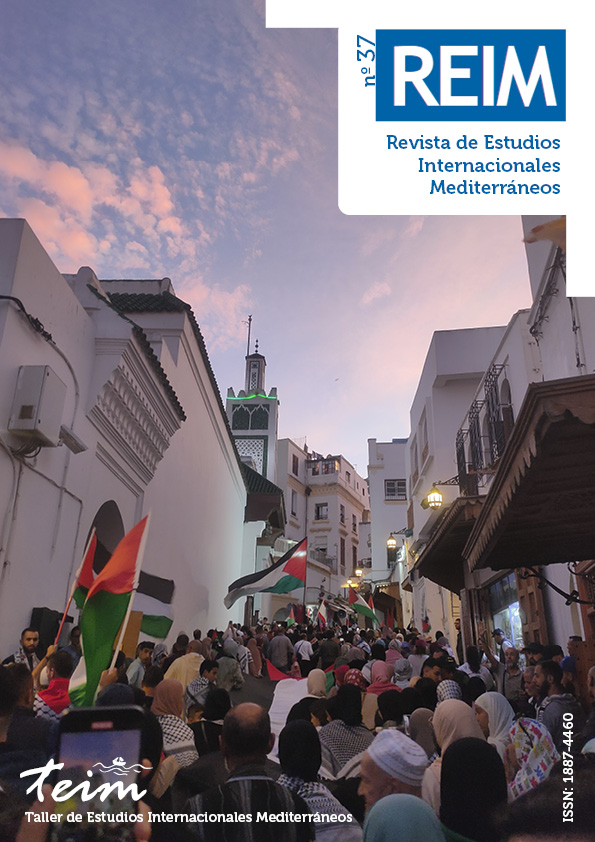Keywords:
Foreign Policy, Libya, Palestine, Pan-Arabism, Armed StruggleCopyright (c) 2024 Álvaro de Argüelles, Ignacio Gutiérrez de Terán Gómez-Benita

This work is licensed under a Creative Commons Attribution-NonCommercial 4.0 International License.
Abstract
Palestine has always played an important role in Libyan foreign policy. During the first years in power of Muammar al-Qaddafi, the struggle for Palestinian emancipation was presented as the synthesis of Arab, Muslim and Third World interests against the threat of imperialism. In the late 1990s, when the collapse of the USSR and the oil price crisis forced Libya to radically transform its foreign policy, the proposal for the creation of an Arab and Jewish ‘Isratine’ served Gaddafi to demonstrate his willingness to reach an agreement with the West, and the first contacts between Libyan and Israeli representatives took place. In the post-civil war scenario, and especially after the arrival of Prime Minister Abdel Hamid Dbaiba in 2021, it has become clear that the elites in both regions of the country wish to normalize relations with Israel at the expense of the popular sentiment. The current conflict in Gaza has put a temporary brake on these rapprochements linked to the energy sector, which, if consolidated, could lead to armed clashes.
Downloads
References
ABADI, Jacob (2000): “Pragmatism and Rhetoric in Libya's Policy Toward Israel”, Journal of Conflict Studies, Vol. 20, No 2.
ANDERSON, Lisa (1986): The State and Social Transformation in Tunisia and Libya, 1830-1980, Princeton, Princeton University Press.
ARAB CENTER WASHINGTON DC (2023): “The Findings of the 2022 Arab Opinion Index” (vídeo), disponible en https://arabcenterdc.org/event/the-findings-of-the-2022-arab-opinion-index/ [consulta: 14 de septiembre de 2024].
BEN-TAHER, Hasen (2024): “The Macroeconomic Effect of Oil Sector Crisis in Libya”, Studies in Business and Economics, Vol: 27, No: 1, pp.22-43.
BLACKWELL, Stephen (2003): “Saving the King: Anglo-American Strategy and British Counter-Subversion Operations in Libya, Middle Eastern Studies, Vol. 39, No.1, pp.1-18.
CECIL, CH.O. (1965): “The determinants of Libya foreign policy”, Middle East Journal, Vol. 19, No.1, pp.20-34.
DEEB, Mary Jane (1991): Libya’s Foreign Policy in North Africa, Londres, Routledge.
FRANCIS, Samuel T. (1982): “Libya’s empire of terror”, Africa Insight, Vol.12, No.1, pp.4-10.
JOFFÉ, George & Paoletti, Emanuela (2011): “The foreign policy process in Libya”, The Journal of North African Studies, Vol. 16, No. 2, pp.183-213.
KUMARASWAMY, P.R. (2000): Revisiting the Yom Kippur War, Londres, Routledge.
LEMARCHAND, René (1988): The green and the black: Qadhafi's policies in Africa, Bloomington, Indiana University Press.
LOEWESNTEIN, Antony & Moor, Ahmed (2024): After Zionism. One State for Israel and Palestine, Londres, Al Saqi.
MAYLIS AL-NUWWAB AL-LIBIYY (2023 a): “Discurso del diputado Hasan al-Barguthi ante el Parlamento Árabe” (en árabe), 19 de octubre, disponible en https://parliament.ly/????-??????-???-????????-????-????-???/ [consulta: 5 de septiembre de 2024].
MAYLIS AL-NUWWAB AL-LIBIYY (2023 b): “Comunicado nº 9 del Congreso de Diputados Libio, sobre la agresión a Gaza” (en árabe), 9 de octubre, disponible en la página oficial, https://parliament.ly/????-????-??????-???-9-????-2023-?-????-????/, [consulta: 5 de septiembre de 2024].
MAYLIS AL-NUWWAB AL-LIBIYY (2023 c): “Bayan raqm 10 li Maylis al-Nuwwab al-Libiyy hawla al-`udwan `ala Gazza” (“Comunicado nº 9 del Congreso de Diputados Libio, sobre la agresión a Gaza”), disponible en la página oficial, 25 de octubre, disponible en https://parliament.ly/????-????-??????-???-10-????-2023?-????-????/ , [consulta: 5 de septiembre de 2024].
METZ, Helen Chapin (1989): Libya: A Country Study, Area Handbook Series, Washington D. C.: Federal Research Division, Library of Congress.
MINIC, Niksa (2023): “15. Gaddafi, Tito, and Libyan Non-aligned Policy”, en Ogbobode Abidde, Sabella; Kumah-Abiwu, Felix (eds.) The Political Impact of African Military Leaders, Nueva York, Springer International Publishing.
OFFICE OF THE HISTORIAN/ DEPARTMENT OF STATE (1967): “Memorandum of Conversation”, Historical Documents, disponible en https://history.state.gov/historicaldocuments/frus1964-68v24/d92 [consulta: 14 de septiembre de 2024].
QUENTZER, Katlyn (2023): “Out of place, out of time: Gaddafi and the Palestinian resistance in the 1970s”, Postcolonial Studies, Vol.26, No.1, pp.77-93.
RONEN, Yehudit (2004): “Libya’s Qadhafi and the Israeli-Palestinian Conflict, 1969-2002”, Middle Eastern Studies, Vol. 40, No.1, pp. 85-98.
RONEN, Yehudit (2008): Qaddafi's Libya In World Politics, Boulder, Lynne Rienner Publishers.
SOLOMON, Hussein & SWART, Gerrie (2005): “Libya’s foreign policy in flux”, African Affairs, Vol. 104, No.416, pp.469-492.
ST. JOHN, Bruce (1981): “Libya’s Foreign and Domestic Policies”, Current History, Vol.80, No. 470, pp.426-429, 434-435.
ST. JOHN, Bruce (1986): “Terrorism and Libyan Foreign Policy, 1981-1986”, The World Today, Vol. 42, No. 7, pp. 111-115.
STOTTLEMYRE, Steve (2012): “Tactical Flexibility: Libyan Foreign Policy under Qadhafi, 1969–2004”, Digest of Middle East Studies, Vol. 21, No. 4, pp.178-201.
WRIGHT, John (2022): Libya. A Modern History, Londres, Routledge.

